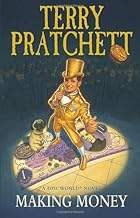No cover image available
Making Money: (Discworld Novel 36) (Discworld Novels) by Terry Pratchett (13-Feb-2014) Paperback
4.5/5
Category
The Invisible Hand…and a Lot of Moist Coin: A Pratchettian Primer on Modern Finance
Terry Pratchett, even at his most fantastical, held a remarkably clear-eyed view of human nature – and the systems we build (and often break). *Making Money*, Discworld Novel 36, isn’t simply a humorous romp through a parallel world; it's a surprisingly astute and often unsettling commentary on the ...
Terry Pratchett, even at his most fantastical, held a remarkably clear-eyed view of human nature – and the systems we build (and often break). *Making Money*, Discworld Novel 36, isn’t simply a humorous romp through a parallel world; it's a surprisingly astute and often unsettling commentary on the evolution of finance, banking, and the very concept of wealth itself. As someone who’s spent years dissecting economic history – from the South Sea Bubble to the intricacies of contemporary high-frequency trading – I found myself consistently impressed by Pratchett’s ability to distill complex ideas into accessible, witty prose.

The story centers on Moist von Lipwig, a charming conman given an ultimatum by Lord Vetinari: reform the Ankh-Morpork Post Office or face…well, let's just say a fate worse than tedious paperwork. However, Vetinari isn’t interested in *just* efficient mail delivery; he wants a modern banking system. Pratchett cleverly uses the Post Office as a springboard to explore how trust, credit, and even speculative bubbles operate. The creation of “clacks” (an early form of telegraph) as a rapid communication system further fuels the novel’s exploration of information asymmetry and its impact on financial markets.
What makes *Making Money* so compelling isn’t just the humor – though it’s abundant, delivered with Pratchett's signature satirical flair. It's the way he humanizes the forces at play. Characters like Mr. Pin, the deeply conservative head of the Royal Mint, aren't villains; they’re products of their time and beliefs, clinging to outdated systems even as the world changes around them. Similarly, Glenda, the golem initially tasked with counting money, evolves into a surprisingly insightful economist. This nuanced character development elevates the story beyond simple caricature.
The cover design perfectly encapsulates this spirit. The dark blue background hints at the often-opaque world of finance, while the gold-suited Moist, gesturing forward with confidence (perhaps a touch *too* much), symbolizes the ambition and risk-taking inherent in modern banking. The inclusion of a turtle and rabbit – slow, steady progress versus rapid speculation – is a wonderfully subtle visual metaphor. The secondary image further emphasizes this duality, with money floating around a pug (a symbol of stubbornness and loyalty) – perhaps representing the entrenched interests resisting change.
Pratchett wasn’t afraid to tackle big themes. *Making Money* explores the very purpose of wealth – is it simply accumulation, or does it have a social responsibility? It touches upon the dangers of unchecked speculation and the role of regulation (or lack thereof). He even anticipates, with unnerving accuracy, some of the issues that led to the 2008 financial crisis. This isn't a dry economics textbook disguised as fantasy; it’s a thoroughly engaging story that makes you *think*.
For those of my readers interested in biographies of financial titans, or perhaps self-help books on building wealth, I’d argue *Making Money* offers a unique perspective. It challenges the conventional wisdom and forces you to consider the ethical implications of your financial choices. While it won’t teach you how to day trade, Terry Pratchett will undoubtedly give you a deeper understanding of the forces shaping our economic world. Highly recommended, especially for those who enjoy a bit of wit with their wisdom.
About the Reviewer
Marcus Whitfield
History, Politics, Economics, Biographies, Business, Financial Literacy, Self-Help
Oxford-educated historian and economist. Former Financial Times columnist, now independent scholar focusing on the intersection of economics, history, and political philosophy. Author of three well-regarded books on economic history.
Related Reviews
Comments
No comments yet
Be the first to share your thoughts on this review!